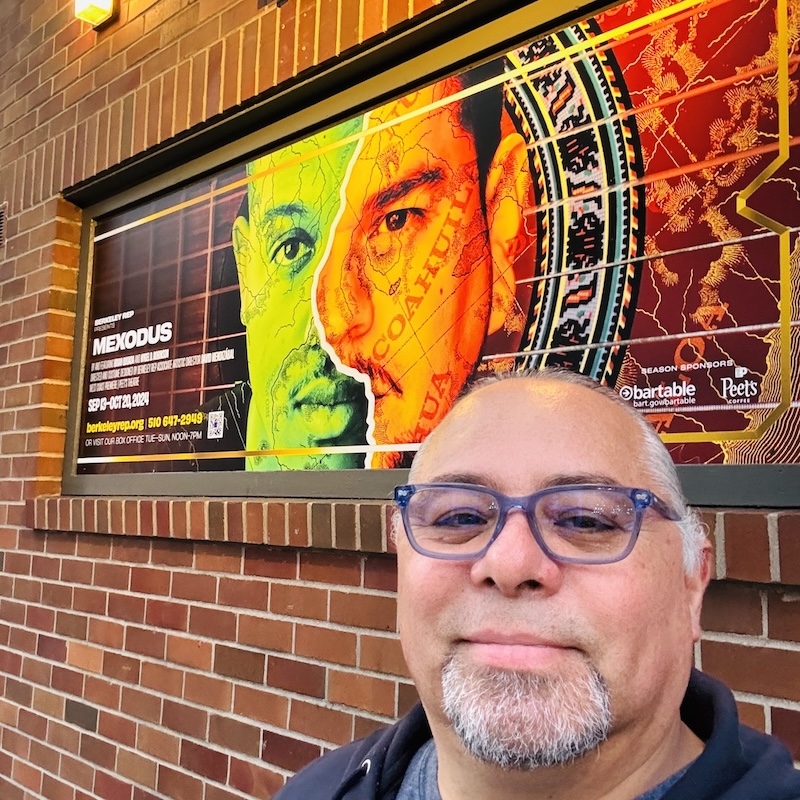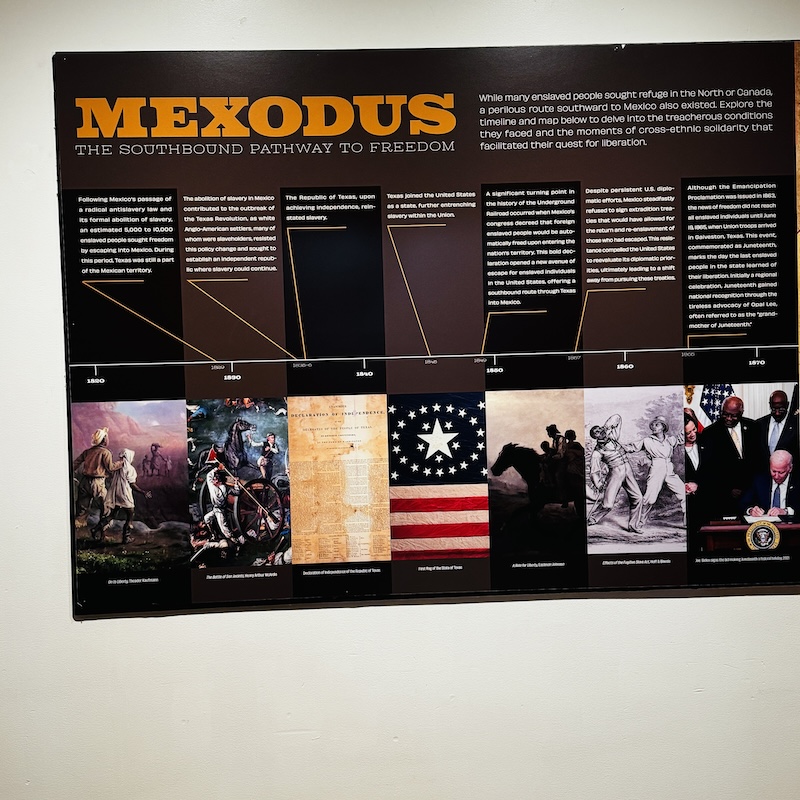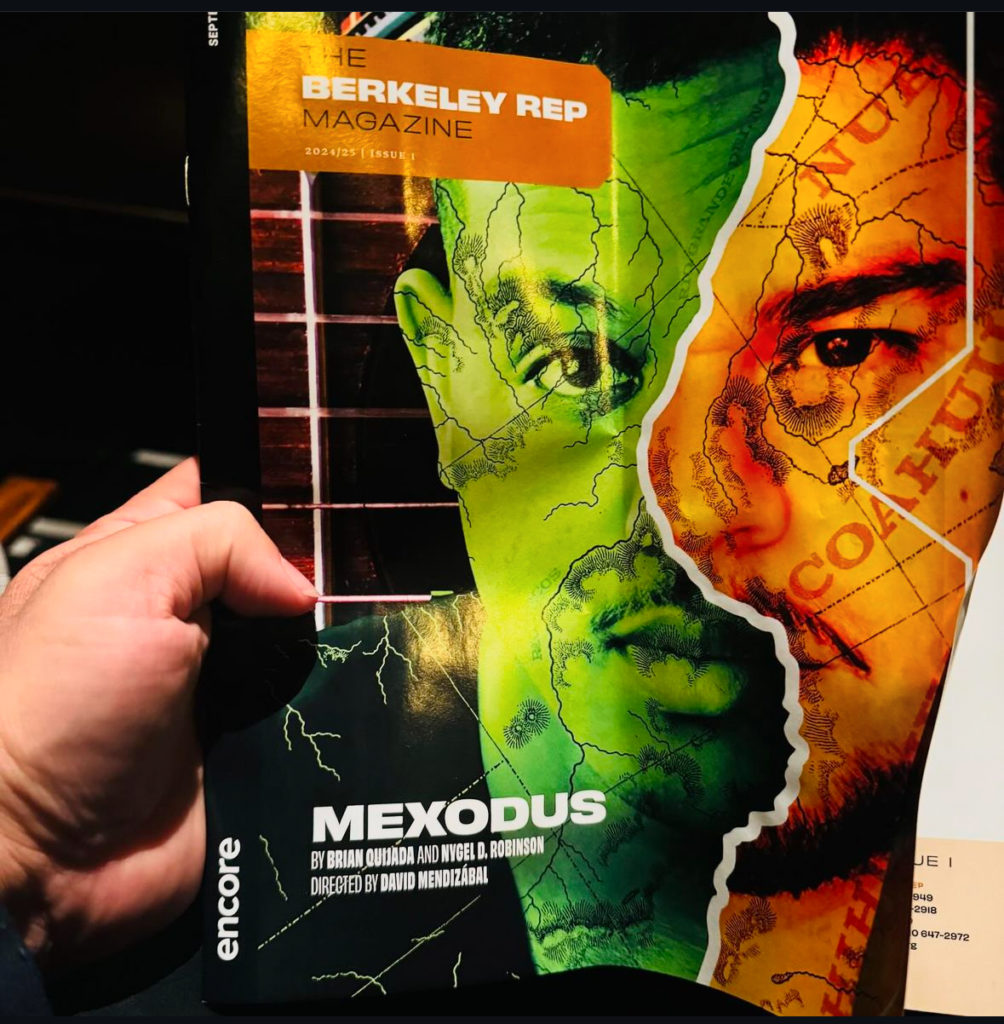00052-MEXODUS
A few days ago I attended the production of MEXODUS, a new hip-hop play by Brian Quijada. This new production took place at Berkeley Rep in Berkeley, CA.
I was excited to see this production for two reasons, three really. 1: “Mexodus” is a Latinx play and Berkeley Rep hadn’t produced one of them in a while. 2: “Exodus” is a hip-hop play and I love hip-hop, and when mix with theatre, I’m in heaven. 3: “Mexodus’s” subject matter is a topic I had never heard of and was incredibly interested in learning about it.
Since this is a new play and Berkeley Rep loves sharing information about their new works by putting displays in their theater’s lobby, I arrived about 45 minutes before curtain time so I could have time to read all the dramaturgical information.
As expected, the lobby display valuable information about the Mexican border, the Treaty of Guadalupe, and how Texas wanted to be an independent state even before the United States was the United States. The main display included data related to the play’s topic: The Underground Railroad between Texas and Coahuila, Mexico’s border state, that aided many slaved blacks found freedom. After reading the lobby displays and finding my seat in the theater, I was ready to let myself be engulfed in “Mexudos.”
The play only has two characters: Carlos and Henry, played by Brian Quijada and Nigel D. Robinson respectively, who are also the playwrights. The show (directed by David Mendizábal) starts with both actors coming on stage and introducing themselves first and then letting the audience know that they will be creating all the music and beats live in front of us. Soon, we are transported to cacophony of sounds coming from all types of objects found on stage. These sounds are looped through a mixer found on a Dj’s table.
Within the first two songs there is no doubt that both actors are incredibly talented. They make music, creating beats, deejaying, and rapping and entertaining the audience. After four songs, a pattern has been stablished. There is a little bit of information on “this and that” and then a hip hop song. More information about “this and that” and then another hip hop song. And after the fourth song it felt predictable and I was looking at my watch.
After the fourth song things change though. The story about Henry, a black slave, starts to take shape as we follow Henry’s struggles and journey to freedom. But here is where the problem lies with this play. While I believe Quijada’s play carries a very strong message and one that is very necessary to impart, ironically, the message, and ultimately Henry’s story is placed in the back burner due to the fact that much emphasis and focus and given to the creation of beats, rapping, deejaying, and music mixes. Instead of feeling as if I was watching a hip hop play, I felt I was attending a hip hop concert where a loosely story was being sporadically being told to sort of give way to more hip hop moments. By the time Henry finds the tunnel that will take him to the underground railroad and ultimately lead him to his freedom, I was disengaged from the story. I was not emotionally involved. The end was so anticlimactic that, but the time I was standing on the street right after exiting the theater, my thoughts and my theatrical experience with “Mexodus” was gone.
I am not saying the production wasn’t good. It was. And both actors are far more talented than I would ever be. But as a play, the script lacks focus and it is in the need of a good dramaturge, of someone who can help both playwrights, to find the spine of the play so his story can be central within the hip hop world he has created.
The hip hop numbers need to thrust the story forward and help create the development of the main character, this is something that doesn’t really happen. There are nice moments here and there, like when the actor Nigel, shares a personal anecdote about his birth and how as a black man, coming from generations of black people, and slavery, he now stands on a professional stage, but overall the story and the character’s journey take a backseat.
And because the actors break the fourth wall from the start, there were times when I wasn’t sure whether it was the actor or the character communicating with us. A moment that comes to mind is when Mr. Quijada, as Carlos, enters from the audience and starts a fire. The fire effect is created with a small orange light and the crackling fire sound is created by Mr. Quijada’s snapping fingers, which are recorded and loop by the actor Nygel who is standing behind the DJ table. All was good until Mr. Quijada look up to the audience and gesture to the fact that he had made the sound of crackling fire. Some of the audience members laughed, others clapped. It was a “tongue in cheek” moment that was confusing because we are forced to ask ourselves who is breaking the fourth wall, the actor or the character. If it’s the actor, why would he do that? To let us know how clever he is as a sound maker? If it’s the character, why would he do that? So far, Henry’s story has been kept completely behind the fourth wall. Perhaps this is not a playwriting thing but a directorial thing. Either way, moments like this keep the audience from engaging with Henry’s story, which by now, has taken a backseat anyway.
As I said earlier, the message and the story that Brian Quijada and Nigel D. Robinson present in “Mexodus” is much needed and necessary. But in order to truly have an effect and in order to truly makes us understand how far we have come and how “we gon be alright” as Kendrick Lamar’s lyrics blast through the speakers, there needs to be a flip in the focus of the play, where the story must be completely integrated into the hip hop numbers thus becoming the central focus rather than the hip hop numbers becoming the center of attention. Otherwise “Mexodus’ is not a play about the “Southbound Pathway to Freedom,” but an opportunity for two very talented actors to showcase their artistic theatrical gifts.



Leave a Reply
You must be logged in to post a comment.